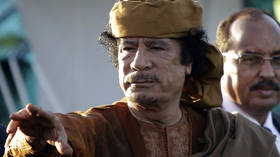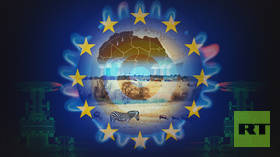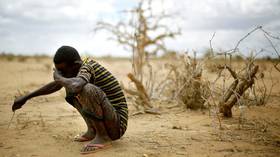Poisoned gifts: The West’s apologies and reparations can be another tool to enslave Africa
The West owes oppressed nations apologies, but those seem to be part of the same old colonial system
These days in Africa, we often hear calls for reparations for the three Western heinous crimes: slavery, slave trade, and colonialism. Reparations for these atrocities are long overdue, but they are not just about financial restitution. The intersectionality of these crimes robbed victims of their identity, cultures, and, more significantly, dignity. Monetary compensation, no matter the value, cannot restore any of these.
Africa’s social, economic, and political challenges are connected to imperialism. Without addressing the legacy of domination, it is almost impossible for Africa to overcome poverty, inequalities, economic stagnation, and political instability. Fundamentally, the call for reparations is about morality and justice. The beneficiaries of imperialism have a moral duty to compensate their victims. The dignity and heritage of black people have been desecrated across time through historical mass crimes and imperial subjugation, as it included the erasure of identity through the looting of religious symbols and cultural relics.
Accra summit
The African Union (AU), the successor to the Organisation of African Unity (OAU), is one of the oldest pan-African organizations aimed at increasing integration within the continent, and, being a G20 member since last September, in the group it represents African nations collectively. Through its various departments, such as The Department of Political Affairs, Peace and Security (PAPS), the Peace and Security Council (PSC), the Economic, Social and Cultural Council (ECOSOCC), and the Citizens and Diaspora Organizations Directorate (CIDO), the bloc is at the forefront in championing reparations for black people in Africa and in the diaspora. In this line, the AU organized a reparations summit in Accra, Ghana, in 2023 that drew a raft of resolutions, one of which was the formation of a Global Reparations Fund for compensation for the victims of slavery, slave trade, and colonialism. “It is time for Africa – whose sons and daughters had their freedoms controlled and sold into slavery – to also receive reparations,” said Ghana’s president, Nana Addo Akufo-Addo.
During the conference, delegates, who included senior government officials from Africa and the diaspora, resolved to engage in campaigns, litigation, and judicial processes to advance the cause for reparations. Between the 16th and 19th centuries, over 12 million able-bodied Africans were forcefully shipped to the Americas and Europe down the infamous Middle Passage, the route for the transatlantic slave trade. They were crucial in the creation of wealth in Europe and the Americas as plantation and industrial workers. Africa, in contrast, languished in misery, backwardness, and underdevelopment while its colonizers, Western multinational corporations, individual barons, and institutions profited from the exploitation of black people. Today, subjugation and domination continue through neocolonialism, racial discrimination, and the extraction of Africa’s natural resources and human capital.
The exploitative capitalist framework is intact under the dependency paradigm. Calls for reparations, therefore, must include overhauling institutions of inequalities. Unequal economic and power imbalance globally manifests through the UN Security Council, World Trade Organization, International Financial Institutions, and rapacious Western corporations. Restitution by way of reparations must include the removal of oppressive laws and policies that impoverish former colonies in Africa and the Caribbean.
Apologies from Germany: Why now?
Germany has apologized for colonial-era atrocities in Namibia and Tanzania. In Namibia, German colonists were responsible for the first genocide in recorded history against the Nama and Herero people. Between 1904 and 1908, German soldiers massacred 65,000 Herero and 10,000 Nama people during a revolt against land seizures. Germany had never apologized or acknowledged this atrocity or correctly characterized it as genocide until 2021. On an official visit to Namibia, German President Frank-Walter Steinmeier pledged $1.2 billion for development projects in Namibia for the benefit of the victims of these colonial-era atrocities. But the Herero paramount chief, Vekuii Rukoro, dismissed the agreement between the two governments as an “insult” from “a so called civilized European nation” because it did not include reparations. Rukoro argued that Germany must engage the communities that bore the brunt of this genocide since the Namibian government could not pretend to negotiate for them. It was irregular, this traditional leader further argued, for the Namibian government to purport to speak for the victims, yet it did not exist at the time the genocide was committed.
In 2023, President Frank-Walter Steinmeier also apologized for colonial-era atrocities in Tanganyika (modern Tanzania), another former colony in which German colonists presided over mass atrocities. But this apology did not involve compensation and reparations either. In colonial Tanganyika, 75,000, or by some records, 200,000-300,000 people were massacred during colonial resistance known as the Maji Maji rebellion. Some of the victims were starved and tortured to death. German colonists also plundered the remains of traditional leaders in Tanganyika, which are still being ghoulishly exhibited in their museums. But it was not only Germany that desecrated the remains of traditional leaders. British colonists were also implicated in this barbaric practice in Kenya. Other colonists across Africa were just as base. The British monarch, during his official visit to Kenya in 2023, the first to a commonwealth member state following coronation, acknowledged the British atrocities in colonial Kenya but did not apologize or pledge reparations.
Why, after decades, is this supposed remorse from Germany? It is not indicative of a change in attitude – but inspired by self-preservation in a fast-changing global order. With the rise of China and other emerging powers, Africa has become strategic to the West. Besides, an increasingly assertive Russia is making a foothold in Africa’s security, especially in the Sahel. The second Russia-Africa Summit held in St Petersburg in 2023 is also evidence of Africa’s strategic significance to Russia’s positioning globally. The expansion of the BRICS bloc, an acronym for Brazil, Russia, India, China, and South Africa, during its 15th summit in Johannesburg, South Africa in 2023 is significant. The admission of Ethiopia, Egypt, Saudi Arabia, and the United Arab Emirates, in a way, signals the broadening of a Global South alliance against Western hegemony, much as these new entrants are Western allies.
Therefore, the US and its European partners have been forced by these developments to reconsider their historically paternalistic policies towards Africa. In the case of Britain, its exit from the European Union makes it imperative to reach out to Africa to reinforce relations that it had ignored to shore up its economy. Western hegemony is on the wane as multipolarity takes form. This has afforded Africa options in trade, investment, research and development, and security. Although it has not discarded it, the paternalism that the West has historically exhibited in relation to Africa is no longer a viable approach. The African Union’s admission to the G20 is part of efforts to shift from paternalism and the characterization of Africa as an appendage of the globe. This move, however, collapses Africa and is insidiously paternalistic.
Europe faces the problem of an aging population, while Africa has a youth bulge. Germany, its economic powerhouse, is positioning itself to benefit from Africa’s demographic dividend by use of human capital. German and other Western tech corporations are outsourcing innovation to technologically savvy youth in Africa. In addition, Germany is easing previously restrictive migration policies to facilitate naturalization and the integration of skilled African migrants into Germany to boost its shrinking workforce. Of course, there are the challenges of unfavorable labor terms, racism, rightwing populist politics, and brain drain. Unless African governments such as the Kenyan one are alert, facilitation of the poaching of Africa’s human capital amounts to complicity in slavery 2.0.
China’s inroads into Africa’s infrastructure development through the Belt and Road Initiative has rattled the West. Beijing’s footprint in Africa is growing through aid, agriculture, its military presence, education and research, and diplomacy. To counter China, the West has cranked up its relations with Africa. Germany, for instance, is targeting Africa’s energy sector consistent with its climate change concerns, whose mitigation includes a shift to renewable energy. Since he assumed office, Germany’s chancellor, Olaf Scholz, has visited several African countries, including Kenya, Nigeria, and South Africa – Africa’s anchor states – on a diplomatic charm offensive. It is unprecedented. These visits are for trade, investment, and skills transfer from Africa. The Russia-Ukraine conflict upended Germany’s energy source and exposed the risk of overreliance on Russia. Africa is one of its alternatives for diversification.
Beyond reparations
It is imperative that measures are put in place at the national and international levels to ensure that countries, companies, and individuals that benefitted from imperialism pay reparations for heinous injustices. The AU-proposed Global Reparations Fund is a step in the right direction. These beneficiaries are morally and legally obliged to repair the economic, social, cultural, and political damage wrought by the unholy trinity of slavery, slave trade, and colonialism. Imperialism inflicted incalculable damage on the colonized, and the most enduring one is psychological. The abiding mindset in colonized societies to mimic colonizers, an indication of low self-esteem and an inferiority complex, is difficult to remedy.
There is a need for a special development fund for former colonies in Africa and the Caribbean. However, anything that carries the word “special” and is reserved for former colonies pathologizes them. The starting point is to rectify the current global financial system. Neoliberalism is responsible for poverty, inequalities, joblessness, and underdevelopment in Africa and other developing countries by way of adverse conditionalities and punitive lending rates. The overhaul of an oppressive and exploitative financial system is imperative. An alternative framework by the BRICS bloc is a welcome initiative.
There is a need for access to international markets for Africa’s products. Trade, research, and development are viable approaches to relations between Africa and former colonizers – but not aid. The Africa Growth and Opportunity Act (AGOA) initiative by the United States (US) somewhat seeks to deemphasize aid. Selected African countries are allowed to export goods to the US duty-free. This arrangement is aimed at earning these countries foreign exchange and boosting their manufacturing. AGOA, however, is a drop in the ocean. And, crucially, it is still a political tool for manipulation that the US wields to make African countries toe its line. Uganda, for instance, was removed from this pact when it enacted laws against homosexuality, along with the Central African Republic, Gabon, and Niger, starting in 2024. The Bretton Woods institutions followed suit and threatened to cut aid to Uganda unless it repealed these laws.
Furthermore, the US threatened South Africa with expulsion from the AGOA agreement because of its expression of support for Russia in the Russia-Ukraine conflict. It is a given that sovereignty is drastically eroded in Africa because of weak economies and soft states. The US, however, does not have a right to abuse the AGOA pact to interfere further in the sovereignty of African states. The lopsided power distribution globally is the crux of the matter, which necessitates the need for a truly multipolar and multilateral world. Bar this, measures geared towards alleviating the plight of former colonies and enslaved people in Africa, the Americas, and the Caribbean will precariously hang on the whims of the West.
Debt cancellation is also a realistic way to advance the reparations agenda. Former colonies are held back by back-breaking debts that dent their development budgets. This causes poverty, inequality, and underdevelopment since these countries cannot meet the basic needs of the people – healthcare, education, food security, potable water, and housing, among other amenities. This situation accounts for political instability in Africa and the diaspora. As such, there are not any novel initiatives to actualize the reparations cause. An oppressive global system consistent with colonialism must be dismantled. The beneficiaries of an unequal world cannot be expected to lead this cause. To demonstrate genuineness regarding atonement for atrocious legacies in Africa, the Caribbean, and the Americas, however, these beneficiaries must endorse campaigns for a just, equitable, and humane global order – which they actually oppose. The enduring imperialism and its corroding capitalist system must be supplanted by an arrangement that dignifies Africans and other former colonies in the diaspora.
The statements, views and opinions expressed in this column are solely those of the author and do not necessarily represent those of RT.








Comments are closed.